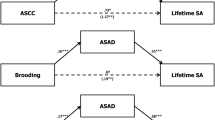Abstract
While various studies have examined cognitive characteristics of suicidal individuals, few have studied attitudes and belief systems; yet these are perhaps the most common foci in the contemporary practice of cognitive forms of therapy. In this study, suicidal and nonsuicidal psychiatric inpatients were administered the Beck Depression Inventory, Hopelessness Scale, Dysfunctional Attitude Scale, and Irrational Beliefs Test. Suicidal patients scored significantly higher on all measures except the Beck Depression Inventory. Examination of Irrational Beliefs Test subscale scores indicated that patients' beliefs about the role of cognition in their unhappiness may be especially important. Implications of these results for the development of cognitive interventions specifically designed for suicidal individuals are discussed.
Similar content being viewed by others
References
Beck, A. T. (1967).Depression: Clinical, experimental and theoretical aspects. New York: Harper & Row.
Beck, A. T., Kovacs, M., & Weissman, A. (1975). Hopelessness and suicidal behavior: An overview.Journal of the American Medical Association, 234 1146–1149.
Beck, A. T., Kovacs, M., & Weissman, A. (1979). Assessment of suicidal intentions; The Scale for Suicide Ideation.Journal of Consulting and Clinical Psychology, 47 343–352.
Beck, A. T., Rush, A., Shaw, B., & Emery, G. (1979).Cognitive therapy of depression. New York: Guilford Press.
Beck, A. T., Weissman, A., Lester, D., & Trexler, L. (1974). The measurement of pessimism: The Hopelessness Scale.Journal of Consulting and Clinical Psychology, 42 861–865.
Beutler, L. E. (1979). Toward specific psychological therapies for specific conditions.Journal of Consulting and Clinical Psychology, 47 882–897.
Dobson, K. S., & Breiter, H. J. (1983). Cognitive assessment of depression: Reliability and validity of three measures.Journal of Abnormal Psychology, 92 107–109.
Ellis, A. (1962).Reason and emotion in psychotherapy. Seacaucus, New Jersey: Citadel.
Ellis, T. E. (1986a). Toward a cognitive therapy for suicidal individuals.Professional Psychology: Research and Practice, 17 125–130.
Ellis, T. E. (1986b, August).Cognitive characteristics of suicide ideators and attempters. Paper presented at the annual meeting of the American Psychological Association, Washington, D.C.
Hankoff, L. D. (1979). Situational categories. In L. Hankoff & B. Einsidler (Eds.),Suicide: Theory and clinical aspects (pp. 235–249). Littleton, Massachusetts: PSG.
Jones, R. G. (1968).A factored measure of Ellis' irrational belief systems with personality and maladjustment correlates. Wichita, Kansas: Test Systems.
Lazarus, A. (1984). The specificity factor in psychotherapy.Psychotherapy in Private Practice, 2 43–48.
Levenson, M. (1974). Cognitive correlates of suicidal risk. In C. Neuringer (Ed.),Psychological assessment of suicide risk (pp. 150–163). Springfield, Illinois: Charles C Thomas.
Levenson, M., & Neuringer, C. (1971). Problem solving behavior in suicidal adolescents.Journal of Consulting and Clinical Psychology, 37 433–436.
Meichenbaum, D., & Jaremko, M. E. (1983).Stress reduction and prevention. New York: Plenum.
Minkoff, K., Bergman, E., Beck, A., & Beck, R. (1973). Hopelessness, depression, and attempted suicide.American Journal of Psychiatry, 130 455–459.
Neuringer, C. (1964). Rigid thinking in suicidal individuals.Journal of Consulting Psychology, 28 54–58.
Neuringer, C. (1967). The cognitive organization of meaning in suicidal individuals.Journal of General Psychology, 76 91–100.
Neuringer, C. (1976). Current developments in the study of suicidal thinking. In E. Shneidman (Ed.),Suicidology: Contemporary developments (pp. 234–254). New York: Grune and Stratton.
Neuringer, C., & Lettieri, D. J. (1971). Cognition, attitude, and affect in suicidal individuals.Life Threatening Behavior, 1 106–124.
Novaco, R. W. (1977). Stress inoculation: A cognitive therapy for anger and its application to a case of depression.Journal of Consulting and Clinical Psychology, 45 600–608.
Patsiokas, A., Clum, G., & Luscomb, R. (1979). Cognitive characteristics of suicide attemptors.Journal of Consulting and Clinical Psychology, 47 478–484.
Riskind, J. H., Beck, A. T., & Smucker, M. R. (1983).Psychometric properties of the Dysfunctional Attitude Scale in a clinical population. Paper presented at a meeting of the World Congress on Behavior Therapy, Washington, D.C.
Turk, D. C., Meichenbaum, D., & Genest, M. (1983).Pain and behavioral medicine. New York: Guilford.
Weissman, A. N. (1980).Assessing depressogenic attitudes: A validation study. Paper presented at a meeting of the Eastern Psychological Association, Hartford.
Wetzel, R. D. (1976). Semantic differential ratings of concepts and suicidal intent.Journal of Clinical Psychology, 32 4–13.
Author information
Authors and Affiliations
Additional information
The authors gratefully acknowledge Dee Caperton, Arthur Kelley, David Walker, and Mamie Chandler for their assistance in the data collection, and Gordon Chelune, James Doria, and Lawrence Rosenfeld for their consultation on the design and data analysis.




